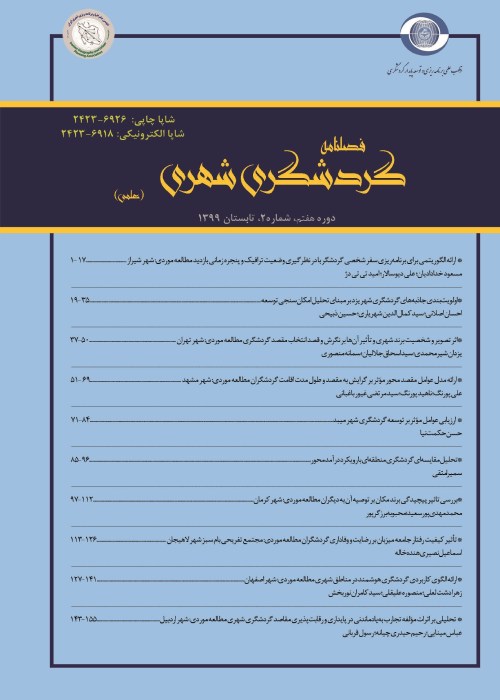Design of Tourism Entrepreneurship Model in Pandemic Crises (Case Study: East and West Azerbaijan Provinces)
During the last half-century, tourism as an economic and social activity has grown and developed significantly and is considered a complex and expanding activity and an effective medicine to improve conditions’ living, employment, and culture. According to many experts, tourism is a part of a country's economy that is primarily related to entrepreneurial activities; because tourism is an industry that improves people's lives by creating foreign exchange income, creating jobs, and balanced income distribution at the regional and local level. In other words, this industry has much potential to create many small businesses and can help develop employment. At the beginning of 2020, while the tourism industry was trying to analyze and plan proposals based on traveler behavior worldwide, on March 11, 2020, the World Health Organization declared the coronavirus (Covid-19) a pandemic. The virus first started in Wuhan, China, but quickly spread to other parts of the world due to limited testing capacity in some countries. Due to tourist attractions, Iran has not been spared from this damage, and an important part of the domestic and foreign tourism industry has suffered. Therefore, in the present study, the researcher intends to adopt an entrepreneurial approach to the presentation of the tourism entrepreneurship model in pandemic crises (Covid 19) and answer the main questions as following:1) What is the tourism entrepreneurship model in pandemic crises (Case study: Covid-19)? 2) What factors influence the formation of this model?
The present study is part of qualitative and fundamental researches in terms of method and purpose, respectively. The data foundation theory method has been used to extract the theory.In order to collect data in the present study, in-depth semi-structured interviews have been used. The statistical population of the study is academic experts and managers and activists of the tourism industry in West and East Azerbaijan who were selected using purposive and theoretical sampling. After conducting 14 semi-structured interviews, the data analysis reached theoretical saturation in the present study, but we continued until interview 18 to ensure and obtain valid data.
After conducting interviews and collecting information, the obtained codes in different sections were analyzed using the systematic approach of Strauss and Corbin. After performing the three open, axial, and selective coding steps, the researcher obtained the final model. The final model consists of 66 concepts extracted from the interviews, in the form of 14 categories and contextual categories, causal conditions, interventionist conditions, strategies, and finally, the consequences and results of tourism entrepreneurship in pandemic crises.
Causal conditions:
These factors indicate the reasons for the occurrence of the phenomenon under study. The main category in this research is the design of the tourism business model with an entrepreneurial approach in crises such as the Covid-19 pandemic, and this central category has emerged under a series of causal conditions. Four categories of demand reduction for services, tourism products due to the outbreak of the disease, the need to adhere to health protocols caused by the epidemic, reduced people's purchasing power, and environmental and legal constraints were identified as causal factors in the proposed model.
Contextual conditions:
These factors include the contexts affecting the formation of tourism with an entrepreneurial approach. In this study, three categories of basic infrastructure for the development of tourism services, the culture and public determination of the community in preventing the corona and the integration of the tourism industry supply chain, and the potential and resilience of businesses in the industry were classified according to contextual conditions.
Intervening conditions:
These conditions refer to those factors that indirectly affect the development of tourism with an entrepreneurial approach in pandemic crises (Covid-19). In this study, two factors of epidemic severity and investment risk during the disease outbreak were identified in the category of intervening factors.
Strategies:
Include reactions and interactions to deal with the central category (phenomenon). In this study, there are three strategies categories of using and developing IT-based tools for smart travel, crisis management in the tourism industry, and promoting domestic travel according to health protocols to boost domestic tourism.
Based on the findings of this study, the correct implementation of the proposed strategies leads to the realization of three main consequences of maintaining and prosperity of tourism businesses, strengthening the tourism industry, and creating a new tourism market for the post-corona era.Despite the post-Corona pandemic constraints, there are unprecedented opportunities for re-use of the tourism industry. Unrepeatable opportunities for redevelopment, in accordance with the principles of sustainability that eliminate dark aspects.
- حق عضویت دریافتی صرف حمایت از نشریات عضو و نگهداری، تکمیل و توسعه مگیران میشود.
- پرداخت حق اشتراک و دانلود مقالات اجازه بازنشر آن در سایر رسانههای چاپی و دیجیتال را به کاربر نمیدهد.


